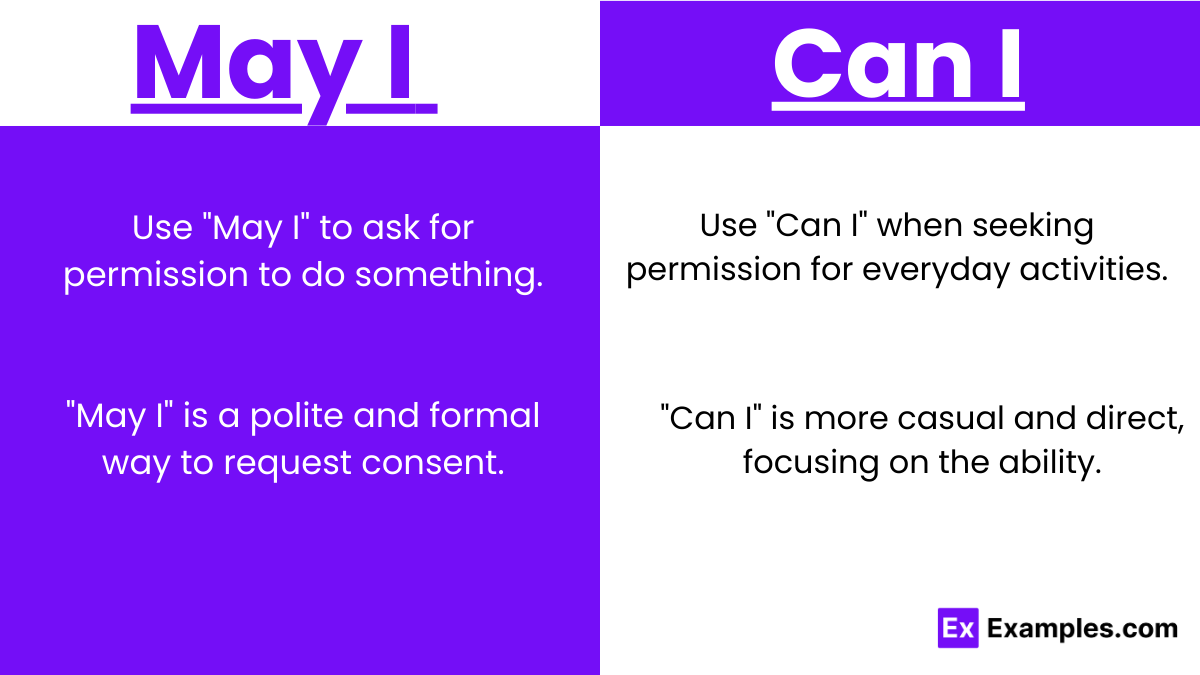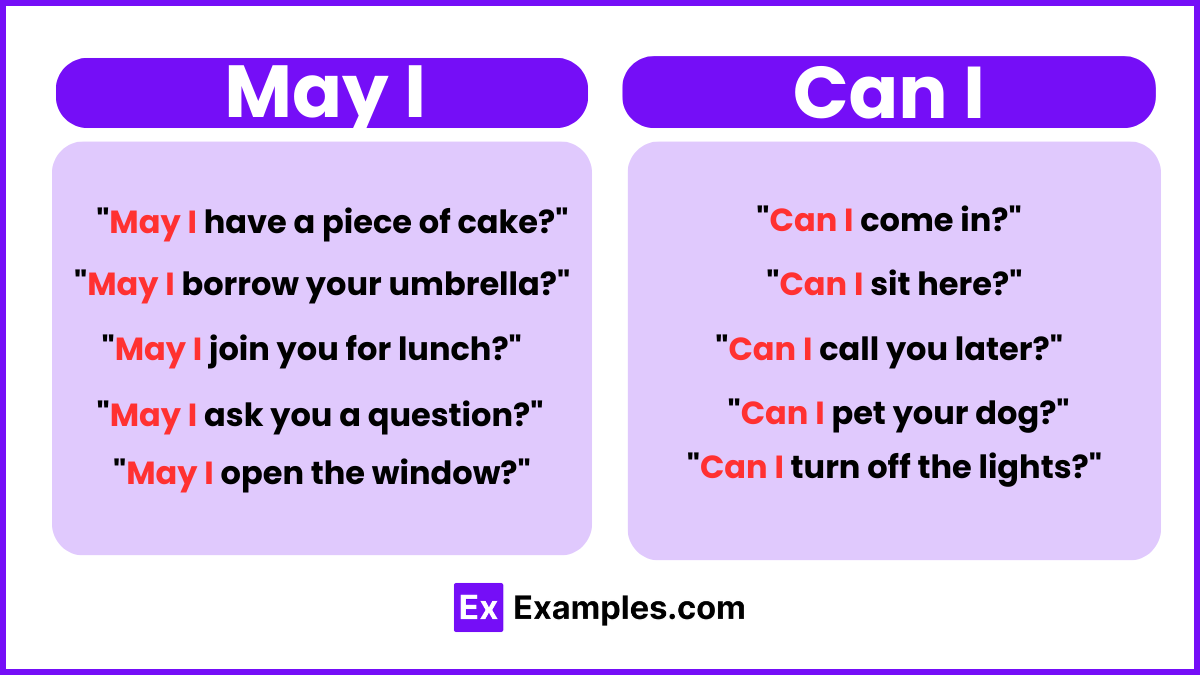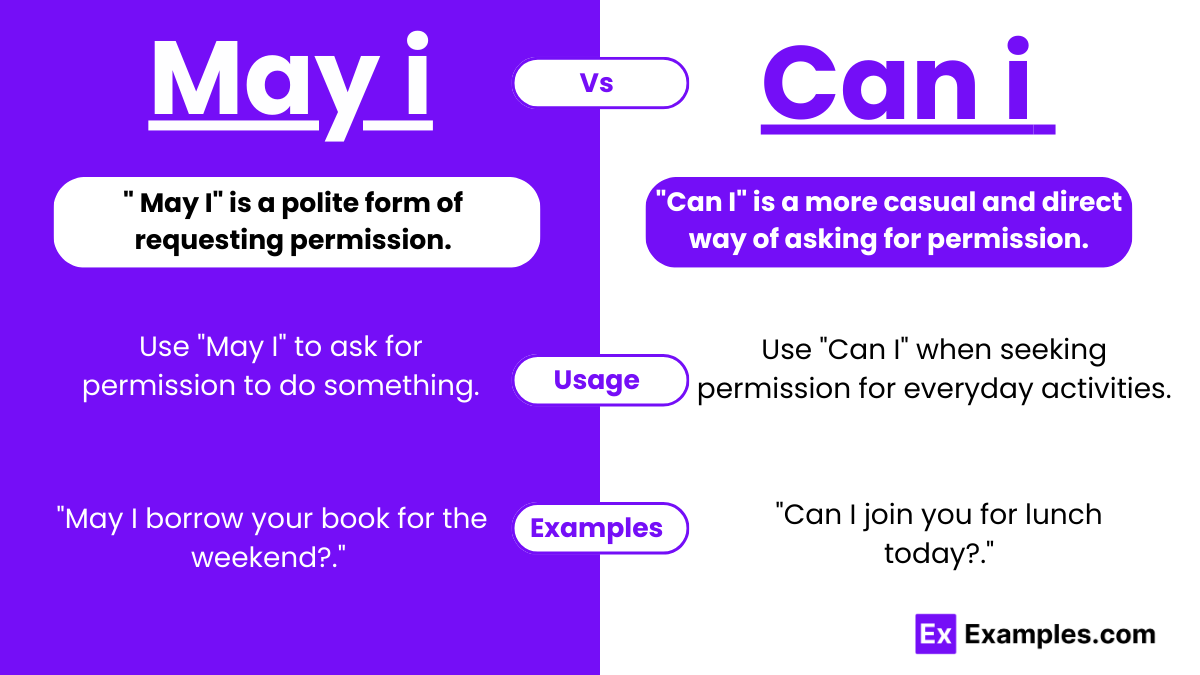May i vs Can i – Meanings, Differences, Usage, Examples, Tricks
Unlock the nuances of “May I” vs “Can I” with our comprehensive guide! Master the art of communication effortlessly by understanding when and how to use each phrase correctly. Delve into practical examples that illuminate their distinctions, empowering you to navigate social interactions with confidence. Elevate your communication skills and refine your language etiquette for any situation. Explore our in-depth comparison to wield these phrases effectively in your daily conversations and written communications.
May i vs Can i – Meanings
May I: “May I” is a polite form of requesting permission or seeking approval to do something. It is commonly used to ask for consent or authorization in a courteous manner. When someone says “May I,” they are typically showing respect and acknowledging the authority or decision-making power of the person they are addressing. This phrase is often used in formal or polite settings to indicate politeness and adherence to social etiquette.
Can I: “Can I” is a more casual and direct way of asking for permission or seeking approval. Unlike “May I,” which emphasizes politeness and formal etiquette, “Can I” focuses more on the ability or capability to perform the action being requested. While still respectful, “Can I” may be used in situations where a less formal tone is appropriate or when seeking permission from peers or in familiar settings. It is straightforward and to the point, indicating a desire to carry out an action without as much emphasis on formalities.
Summary
How To Pronounce May i vs Can i
How to Pronounce “May I”
- “May I” is pronounced as “may” followed by “I.”
- Emphasize the “may” sound, with a clear and distinct pronunciation of both syllables.
- The “I” is typically pronounced as a short, clear vowel sound, similar to the pronoun “I” in English.
- Maintain a polite and respectful tone when saying “May I,” reflecting its formal nature.
How to Pronounce “Can I”
- “Can I” is pronounced as “can” followed by “I.”
- Place emphasis on the “can” sound, ensuring it is pronounced clearly and with authority.
- The “I” is pronounced similarly to the pronoun “I,” with a short and clear vowel sound.
- “Can I” is typically spoken with a more casual and direct tone compared to “May I,” reflecting its less formal nature.
Differences Between May i vs Can i
| Aspect | “May I” | “Can I” |
|---|---|---|
| Formality | More formal and polite. | Less formal and direct. |
| Politeness | Emphasizes respect and adherence to etiquette. | Focuses on capability or permission. |
| Social Setting | Commonly used in formal or polite situations. | Often used in casual or informal settings. |
| Tone | Polite and respectful. | Casual and straightforward. |
| Usage | Asking for permission with courtesy. | Seeking permission with directness. |
How to Remember the Tricks Between “May i ” and “Can i ”
Mnemonic Device:
- Create a mnemonic such as “May I – Manners, Can I – Capability.” This helps remember that “May I” emphasizes politeness and manners, while “Can I” focuses on capability.
Visual Association:
- Visualize a scene of asking permission in a formal setting for “May I,” perhaps with someone bowing politely, and for “Can I,” envision a casual scenario like a friend casually asking to borrow something.
Role Play:
- Act out scenarios using both phrases to get a feel for their differences. Practice using “May I” in formal situations like asking a teacher for permission and “Can I” in more casual settings like asking a friend to join an activity.
Sentence Examples:
- Create example sentences that highlight the differences. For instance, “May I have a moment of your time?” versus “Can I borrow your pen?” This reinforces the usage contextually.
Rhymes or Jingles:
- Invent a simple rhyme or jingle like “May I, polite and high; Can I, more casual, try.” This makes the differences memorable through rhythm and repetition.
When to Use May i and Can i

Usage of “May I”
- Formal Situations: In formal settings such as in professional environments, with authority figures, or when addressing elders.
- Politeness Required: When politeness and respectfulness are crucial, like when asking for a favor or seeking permission.
- Requesting Permission: Use “May I” to ask for permission to do something, indicating deference and acknowledging authority.
Usage of “Can I”
- Informal Settings: In casual situations among friends, peers, or family members where formalities are not required.
- Asking About Ability: When inquiring about one’s capability or whether something is physically or technically possible.
- Seeking Informal Permission: Use “Can I” when seeking permission for everyday activities or actions, where politeness is still appreciated but not strictly required.
May i and Can i Examples

Examples Using “May I”
- May I borrow your book for the weekend?
- May I have a moment of your time to discuss this matter?
- May I use your restroom, please?
- May I speak to the manager regarding this issue?
- May I help you with your groceries?
Examples Using “Can I”
- Can I borrow your phone charger for a while?
- Can I join you for lunch today?
- Can I have some more milk in my coffee, please?
- Can I take a rain check on our meeting?
- Can I leave work a bit early today for a personal appointment?
Synonyms For May i and Can i
| “May I” Synonyms | “Can I” Synonyms |
|---|---|
| Could I | Am I able to |
| Might I | Am I permitted to |
| Would it be possible for | Is it okay if I |
| Do I have permission to | Am I allowed to |
| Could you please | Is it all right if I |
Exercise
Instructions: Fill in the blanks with the appropriate words, “May I” or “Can I,” to complete each sentence correctly.
- ___________ borrow your pen for a moment?
- ___________ have some more coffee, please?
- ___________ leave the meeting early today?
- ___________ ask you a question about the assignment?
- ___________ use your phone to make a quick call?
- ___________ assist you with anything else?
- ___________ take a rain check on our dinner plans?
- ___________ have a moment of your time to discuss this matter?
Answers:
- May I
- Can I
- Can I
- May I
- Can I
- May I
- Can I
- May I
FAQ’S
Which is more polite May I or can I?
“May I” is generally considered more polite than “Can I” as it acknowledges authority and emphasizes respect, while “Can I” is more casual and direct.
Can I ask or may I ask?
Both “Can I ask?” and “May I ask?” are commonly used. “May I ask?” is slightly more formal and polite, while “Can I ask?” is more casual but still acceptable in most situations.
Is May I used as a polite request?
Yes, “May I” is commonly used as a polite request, indicating respect and adherence to social etiquette when asking for permission or seeking approval.
What word can I use instead of May?
Instead of “May,” you can use words like “might,” “could,” or “would,” depending on the context, to convey a similar sense of possibility or permission.


